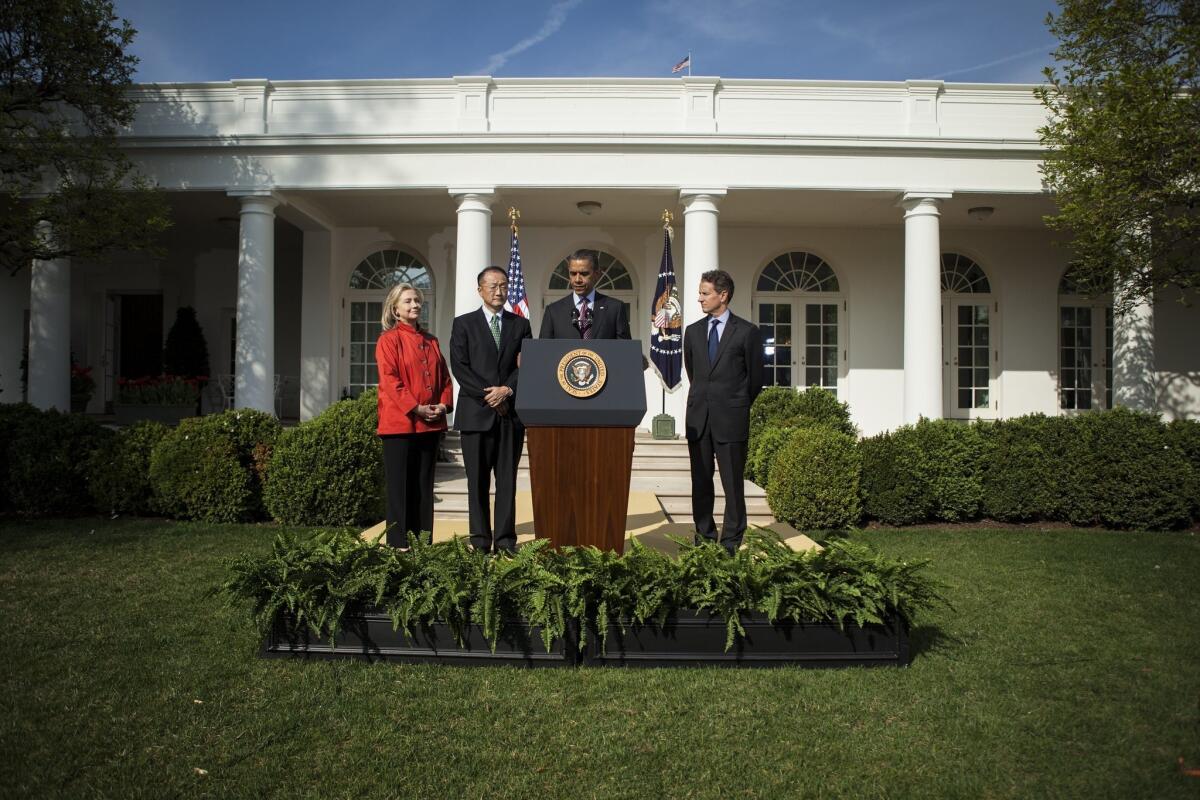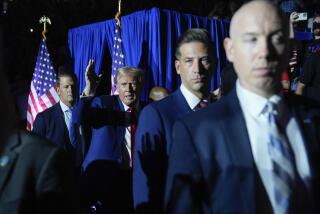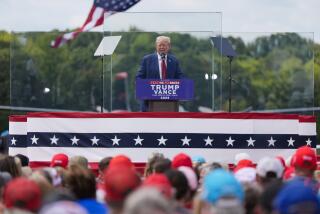Obama addresses Trayvon Martin shooting death in personal terms

- Share via
Reporting from Washington — Declaring that “if I had a son, he’d look like Trayvon,” President Obama chose a highly personal way to join the heated national debate over the death of Trayvon Martin, the black teenager fatally shot by a neighborhood watch volunteer in Florida.
Obama took care to voice no opinion on the conduct of the shooter, George Zimmerman, or any legal aspect of the case beyond a call for a thorough investigation. “The attorney general reports to me so I’ve got to be careful about my statements to make sure that we’re not impairing any investigation,” he said.
Yet his remarks Friday could have a powerful influence on how the public views the case. It was a rare White House moment — a president identifying himself with a victim in a racially-charged shooting. More broadly, it drew attention to the way young black men are seen by a predominantly white society.
Whether Zimmerman acted legally in the Feb. 26 shooting and whether the Sanford, Fla., police acted properly in declining to arrest him turn in large part on how the victim is viewed.
Zimmerman, 28, has claimed he shot Martin, 17, in self-defense after calling police to say he was following a person in his gated community who he believed was acting suspicious. Supporters of Martin’s family have said the high school student was merely walking to a relative’s home and that nothing about him could reasonably have been considered suspicious or threatening.
Martin’s parents appeared to acknowledge that Obama’s public identification with their son carried huge symbolic importance.
“The president’s personal comments touched us deeply,” they said. The remarks “made us wonder: If his son looked liked Trayvon and wore a hoodie, would he be suspicious too?”
Rep. Frederica Wilson (D-Fla.), who has been in close contact with the Martin family, expressed a view held by many black leaders: that being targeted for violence “is the reality of being a black boy in America.”
“It’s a problem that has existed for generations since slavery,” she said, expressing the hope that Obama’s remarks might change how black men are perceived.
“Every time the president is realistic about a situation, it helps the country grow and mature,” she said.
Obama’s comments were not written in advance, aides said, but they came after a week in which the president has been closely following the case. During a trip to Western states over the last two days, he read articles about the shooting and commented privately about how the teenager’s family must feel, and how he would take such news if it ever came to his door.
On Thursday, Obama called the Rev. Al Sharpton to express condolences over the death of Sharpton’s mother. Sharpton was on his way to a rally about the case which he had helped organize. Aides said they assumed the two men talked about the shooting, although Obama did not explicitly tell them so.
Initially, the president had hesitated to speak publicly about the shooting, concerned that he would appear to be trying to affect the outcome of the case, but over the week his view shifted. “He did not want to jeopardize the independent investigation,” a senior administration official said, “but he also felt that we need to ask ourselves how this could happen.”
On his way out to the Rose Garden on Friday morning to announce a nominee to head the World Bank, he told aides that he would comment on the Martin case if asked about it — a contrast with his frequent practice of spurning questions in formal settings if they depart from the topic of the day.
He was “speaking as a parent,” said the official. “He was very deeply troubled by the death of a very young man.”
The comments shifted the White House position, which had been to keep a distance from the case. Tuesday, for example, Press Secretary Jay Carney had said only that “we here in the White House are aware of the incident” and that “our thoughts and prayers go out to Trayvon Martin’s family, but obviously, we’re not going to wade into a local law-enforcement matter.”
By contrast, Obama said that “it is absolutely imperative that we investigate every aspect of this, and that everybody pulls together — federal, state and local — to figure out exactly how this tragedy happened.” People should “examine the laws and the context for what happened, as well as the specifics of the incident,” he said.
Republican presidential hopefuls joined Obama in his call for a thorough investigation.
“What happened to Trayvon Martin is a tragedy,” Mitt Romney said in a written statement. “There needs to be a thorough investigation that reassures the public that justice is carried out with impartiality and integrity.”
Campaigning at a shooting range in West Monroe, La., Rick Santorum called Martin’s death a “horrible case.”
“It’s chilling to hear what happened,” Santorum said. “The fact that law enforcement didn’t immediately go after and prosecute this case is another chilling example of, I would say, the horrible decisions made by the people in this case.”
That consensus was a sharp contrast with the only previous time that Obama, as president, commented on a case involving law enforcement and race. Early in his tenure, he received considerable criticism after saying that police in Cambridge, Mass., had “acted stupidly” in arresting Henry Louis Gates Jr., a Harvard professor who is a friend of the president’s.
At the time, administration officials said Obama was surprised by the reaction to that statement. This time, he spoke more carefully. He only raised the racial aspects of the case obliquely, and said, “All of us have to do some soul searching to figure out how does something like this happen.”
His care made his words more effective, said Douglas Brinkley, a presidential historian at Rice University in Houston.
“There’s advantages to thinking and digesting,” Brinkley said. “He waited the right amount of time, gathered information, thought on what he wanted to say, and executed how to do it in just the right way.”
“His words today were really healing gestures for the nation.”
Times staff writers Ian Duncan in Washington, John Hoeffel in West Monroe, La., and Maeve Reston and Molly Hennessy-Fiske in Los Angeles contributed to this report.
Obama addresses shooting death in personal terms
More to Read
Get the L.A. Times Politics newsletter
Deeply reported insights into legislation, politics and policy from Sacramento, Washington and beyond. In your inbox twice per week.
You may occasionally receive promotional content from the Los Angeles Times.












